Biomedical Data Science Center
Our Mission
The mission of the New York Tech’s Biomedical Data Science Center is to establish a fertile and collaborative research and educational environment that encourages the exchange of ideas between interested New York Tech faculty and students from diverse departments. In addition, the Biomedical Data Science Center will be committed to exposing undergraduate, graduate, and medical students to research in this exciting new field in order to train and grant degrees to the next generation of biomedical data scientists.
Our Goals
Through the work of an interdisciplinary committee, consisting of thirteen faculty members from the College of Arts and Sciences, College of Engineering and Computing Sciences, and College of Osteopathic Medicine, the New York Tech Biomedical Data Science Center aims to promote interdisciplinary research and education in a range of academic areas. More specifically, the people at the center will:
- Foster interdisciplinary collaboration and support across New York Tech departments and colleges.
- Train students and provide (internal) financial support.
- Obtain (external) interdisciplinary grants for research and training.
- Recruit faculty and students.
- Provide scientific outreach.
Our Research
The Biomedical Data Science Center at New York Institute of Technology is a dynamic, interdisciplinary research hub that unites faculty across biomedical sciences, computer science, engineering, mathematics, and physics. Its mission is to drive innovation in human and environmental health through advanced data science and computational modeling.
The center’s core strengths include computational biology, machine learning, bioinformatics, and signal/image processing. Members have developed deep learning models to predict treatment response in depression, distinguish between psychiatric conditions using EEG data, and analyze signals from wearable health devices. Others apply advanced image processing and inverse modeling for noninvasive diagnostics and microwave sensing.
In cancer and developmental biology, Biomedical Data Science Center researchers investigate pediatric brain tumors, breast and ovarian cancers, and metastasis mechanisms. Their work integrates transcriptomics, epigenetics, and animal modeling to uncover novel therapeutic targets. Simultaneously, medicinal chemists and pharmacologists contribute to drug discovery, leveraging structure-based design, molecular dynamics, and cheminformatics to identify leads for treating diseases ranging from cancer to honey bee infections.
The center also advances mathematical modeling and biological network theory, employing tools from quantum physics, graph curvature, and nonlinear dynamics to study gene regulation, multiciliogenesis, and tissue development. In the field of regenerative medicine and biomechanics, Biomedical Data Science Center members explore microRNA regulation of bone healing, biomaterials, and stem cell mechanobiology.
Our Members
New York Tech’s Biomedical Data Science Center is an interdisciplinary center, comprising thirteen faculty members from the College of Arts and Sciences, College of Engineering and Computing Sciences, and College of Osteopathic Medicine. Its mission is to promote interdisciplinary research and education in the fields of biology, chemistry, mathematics, physics, computer science, and medicine.

Leonidas Salichos, Ph.D.
Director, Biomedical Data Science Center
Assistant Professor, Biological & Chemical Sciences
College of Arts & Sciences
Leonidas Salichos has a strong background in evolutionary and computational biology. While earning his M.S. in Agricultural Engineering at the Agricultural University of Athens, he developed a method that maps viral outbreaks. While working towards his M.S. in Bioinformatics at Katholieke Universiteit Leuven, he continued working on viruses by genotyping HIV strains. He earned his Ph.D. from Vanderbilt University in 2014. For his Ph.D. thesis, he developed several computational tools, including machine learning metrics to measure the internode and phylogenetic tree certainty based on conflicting phylogenetic signals.
Read More
As a postdoctoral researcher at Yale University, he worked on developing algorithms that calculate the impact of driver mutations in cancer by estimating growth patterns using variant allele frequencies. He also worked on the identification of mutational patterns and signatures, tumor subclonal architecture, and expressional profiles in 2800 cancer tumors.
Recent Projects/Research
- Modeling the spread of infectious diseases
- Studying microbial populations across human tissues
- Determining genomic regions that impact tumor progression and immunotherapy treatments
- Using wearable technology to monitor physiological responses for diving readiness and performance
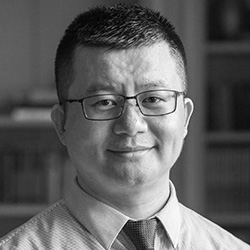
Yusui Chen, Ph.D.
Assistant Professor, Physics
College of Arts & Sciences
Yusui Chen has been a tenure-track assistant professor of physics at New York Institute of Technology since Fall 2018. He received his Ph.D. in Physics from the Stevens Institute of Technology in 2015 and his B.S. in Physics from Nanjing University in 2005.
Recent Projects and Research
Chen’s research focuses on quantum information science and engineering, with distinct expertise in theoretical modeling and simulation of complex quantum systems, with an emphasis on non-equilibrium processes. Moreover, he and his collaborators have developed a master equation methodology to study the dynamics of entanglement and decoherence within multi-qubit systems, particularly in the presence of environmental noise. This study harnesses a synergy of classical computing and quantum simulation techniques. Furthermore, he has conducted a comprehensive exploration into the utilization of entanglement to propel advancements in quantum metrology.
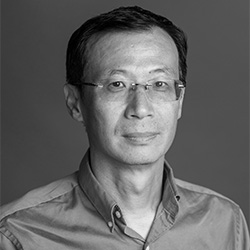
Jerry Cheng, Ph.D.
Associate Professor, Computer Science
College of Engineering & Computing Sciences
Jerry Cheng is an assistant professor of computer science at the New York Tech College of Engineering and Computing Sciences. He earned his Ph.D. in statistics from Rutgers University. Before joining New York Tech, Cheng was on the faculty of the Robert Wood Johnson Medical School at Rutgers University. Prior to joining academia, he was a post-doctoral researcher at Columbia University, and he also worked at AT&T Labs.
Recent Projects and Research
Cheng’s current research interests include big data analytics, artificial intelligence, data mining, statistical modeling, and high-performance computing. The main applications of his work lie in the areas of mobile computing, information security, and healthcare. His research has secured multiple grants from the National Science Foundation and the Army Research Office.

Claude Gagna, Ph.D.
Professor, Biological & Chemical Sciences
College of Arts & Sciences
Claude Gagna is a professor in the Department of Biological and Chemical Sciences. He is the course director of Anatomical Sciences (e.g., Histology, Anatomy, Physiology, Embryology, and Pathophysiology) and a senior educator in lecture and labs. Gagna is a molecular biologist, DNA nanotechnologist, and human anatomist who holds patents and has published conference proceedings/abstracts, book chapters, review articles, case studies, methodologies, and original research articles.
Read More
He received his B.S. in Biology from St. Peter’s University, his M.S. in Human Anatomy (minor: Genetic Engineering) from Fairleigh Dickinson University School of Dental Medicine, and his Ph.D. from New York University-Basic Medical Sciences (Department of Human Anatomy, and Department of Biochemistry). He was a postdoctoral fellow at NYU-Basic Medical Sciences and Rutgers-NJMS.
Recent Projects and Research
Gagna’s research focuses on the development of next-generation DNA and RNA microarrays, i.e., canonical, and multistranded, alternative and transitional helical (C‐MATH) nucleic acid microarrays: double‐, triple-, and four‐stranded DNA and RNA microarrays. They can be used for the characterization of gene functions (e.g., transitions in DNA structures) and drug discovery (e.g., drugs or biologics that inhibit gene expression). Additionally, Gagna is developing novel spatial genomic methods, i.e., Genomesorganizomics, based on canonical and non-canonical DNA and RNA structures, i.e., B-DNA, Z-DNA, triplex DNA, and quadruplex DNA. He also focuses on clinical disease-based research, i.e., cancer (e.g., melanoma), dermatophytes, and xeroderma pigmentosum.
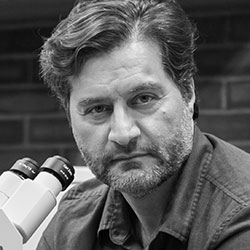
Michael Hadjiargyrou, Ph.D.
Distinguished Professor, Biological & Chemical Sciences
College of Arts & Sciences
Hadjiargyrou received his training in molecular and cell biology at the City University of New York and completed his post-doctoral fellowship at the California Institute of Technology. Prior to joining New York Tech, he served as assistant and associate professor in the Department of Biomedical Engineering at Stony Brook University, as well as graduate program director and associate vice president for research. He is a member of the American Society for Bone and Mineral Research and the Federation of American Societies for Experimental Biology and serves on the editorial Board of a number of scientific journals.
Recent Projects and Research
- MicroRNA mechanisms during fracture repair
- Transcriptional Profiling of Bone Regeneration
- Discovery and characterization of Mustn1
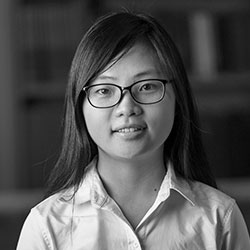
Xueqing (Summer) Huang, Ph.D.
Assistant Professor, Computer Science
College of Engineering & Computing Sciences
Xueqing Huang is an associate professor in the Department of Computer Science at New York Tech. She possesses extensive research experience in algorithm design and performance optimization for various Internet of Things (IoT) applications. Huang has a track record of over 40 peer-reviewed publications and is consistently featured in top-tier journals within her domain, such as IEEE Transactions on Networking and IEEE Transactions on Cloud Computing. With expertise in data analysis and biostatistics, she also harbors research interests in data-driven stem cell maturity evaluation and promotion, molecule discovery, and precision medicine.
Recent Projects and Research
- Wireless Mobile Edge Computing: resilient vehicle networks, physical-layer security of IoT devices, crowdsourced video content generation, storage, and distribution
- Data Science: energy management for residential buildings, stem cell study, and precision medicine
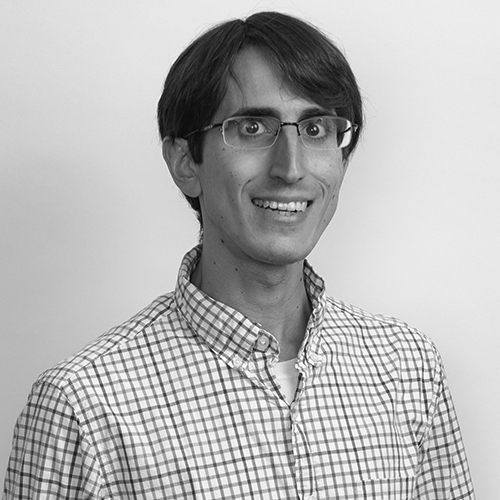
Wiliam Letsou
Assistant Professor, Biological & Chemical Sciences
College of Arts & Sciences
William Letsou earned his Ph.D. in Chemistry at the California Institute of Technology under Long Cai. His dissertation focused on the regulation of complex biological networks by noncommutative signaling molecules. Using techniques from enumerative combinatorics, he showed that temporal encoding involving a small number of regulators far surpasses the reachable space of traditional combinatorial/Boolean logic. After Caltech, Letsou moved to St. Jude Children’s Research Hospital in Memphis, Tenn., where he worked in the Department of Epidemiology and Cancer Control.
Read More
There he developed computational tools to look for combinations of genetic variants associated with disease risk. Letsou developed a pattern-mining algorithm to detect haplotypes—combinations of alleles on the same chromosome—enriched among individuals affected with disease. Using this method, he showed that a few top breast cancer risk SNPs are in fact poor tags for underlying rare, risk haplotypes of large effect, suggesting that the polygenic diseases may be more Mendelian than previously imagined.
Recent Projects and Research
Letsou’s research at New York Tech aims to further the study of combinatorics in biology. With advances in parallel computing, it will be possible to study the association of hundreds of different variables with medically and biologically relevant outcomes. Equally important is developing sound statistical and physical models that make this information understandable to humans. Connecting the observed combinatorial associations with an underlying biological reality, which may be noncommutative in nature, is a long-term goal of his research program.
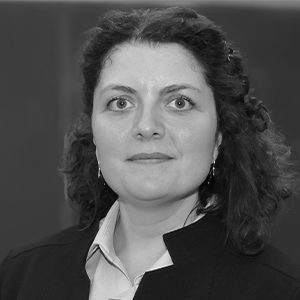
Berin Karaman Mayack
Assistant Professor, Biological & Chemical Sciences
College of Arts & Sciences
Dr. Berin Karaman Mayack earned her bachelor’s degree in pharmacy as the Salutatorian from the Faculty of Pharmacy at Marmara University in 2008. She was awarded a TÜBİTAK National Scholarship to pursue her graduate studies, completing her master’s degree in Pharmaceutical Chemistry at the Institute of Health Sciences, Istanbul University, between 2008 and 2010. In 2015, she obtained her Ph.D. in Medicinal Chemistry from Martin Luther University Halle-Wittenberg in Germany.
Read More
During her graduate studies, Dr. Karaman Mayack participated in several funded projects, including the EU-F7P program Project A-PARADDISE (Anti-Parasitic Drug Discovery in Epigenetics). She also received funding from the Deutsche Forschungsgemeinschaft (DFG) and the Landesgraduiertenförderung Sachsen-Anhalt Scholarship. In 2016, she joined the University of Paris Descartes as a postdoctoral fellow, where she contributed to the ANTARES (Antalgic Research) project funded by the French National Research Agency (Agence Nationale de la Recherche).
From 2017 to 2022, Dr. Karaman Mayack held the position of Assistant Professor in the Pharmaceutical Chemistry Department at both Biruni University and Istanbul University in Turkey, receiving funding from the Scientific Research Projects Units of both institutions. Between 2022 and 2025, she served as a Visiting Scientist in Professor Heike Wulff’s lab in the Pharmacology Department at the University of California, Davis.
In addition to her scientific research, Mayack has trained and mentored more than 30 undergraduate and graduate students in CADD, medicinal chemistry, and cheminformatics. She is also a licensed pharmacist in Turkey and brings a comprehensive understanding of drug discovery from molecular design to clinical application.
Recent Projects and Research
Mayack’s research focuses on the application of in silico tools for small molecule hit identification, hit expansion, and lead optimization. Her current work includes:
- Computational Drug Discovery – Applying molecular modeling, virtual screening, and docking to identify novel therapeutic compounds.
- Interdisciplinary Drug Development – Leading early drug discovery efforts through collaborative projects integrating chemistry, biology, and pharmacology.
- Honey Bee Health and CADD – Initiating a novel research direction using CADD approaches to identify treatments for honeybee diseases, with two USDA proposals under review (one as principal investigator).
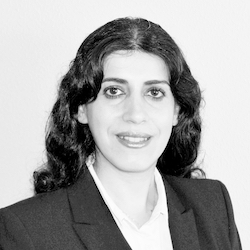
Maryam Ravan, Ph.D.
Research Assistant Professor, Electrical & Computer Engineering
College of Engineering & Computing Sciences
Maryam Ravan is a research associate professor in the Department of Electrical and Computer Engineering at New York Institute of Technology. She joined New York Tech in 2017, following a career that spans academia and industry. Prior to New York Tech, she served as a senior research scientist at LivaNova PLC, where she developed machine learning algorithms and biomarkers to evaluate the efficacy of closed-loop Vagus nerve stimulation (VNS) therapy for epilepsy.
Read More
Ravan holds a Ph.D. in electrical engineering from Amirkabir University of Technology (Tehran Polytechnic). She completed postdoctoral fellowships at both the University of Toronto and McMaster University, contributing to research in forward modeling, inverse problems, and signal/image processing for applications in neural engineering, radar systems, and non-destructive testing. She also served as a lecturer at the School of Computational Engineering and Science at McMaster University.
She is a senior member of IEEE and has authored or co-authored over 100 peer-reviewed journal and conference publications, including a book and book chapter published by Wiley-IEEE Press.
Recent Projects/Research
Ravan’s research integrates advanced computational approaches to solve real-world biomedical problems. Her recent projects include:
- EEG-based Deep Learning Models: Development of diagnostic algorithms to distinguish between psychiatric disorders such as major depressive disorder, bipolar disorder, and schizophrenia, using resting-state EEG data.
- Predictive Modeling for Antidepressant Response: Building deep learning frameworks to predict patient response to treatments like Sertraline and Bupropion based on pre-treatment EEG.
- Wearable and Inductive Sensing Systems: Leading efforts like “GloveSense,” a hand gesture recognition system using inductive sensing, and other applications in smart wearable technology.
- Microwave Imaging and Environmental Sensing: Use of microwave sensor arrays for applications such as pollutant detection in water and non-invasive medical imaging.
Her research is currently supported by multiple prestigious grants, including two NSF awards (Award Nos. 1920098 and 2420783), and institutional support through New York Tech’s ISRC grants. In 2024, she was selected for the U.S. Department of Energy’s Visiting Faculty Program at Brookhaven National Laboratory. Her work has been widely featured in scientific and public media, including IEEE Spectrum, LifeWire, and NYIT Magazine.
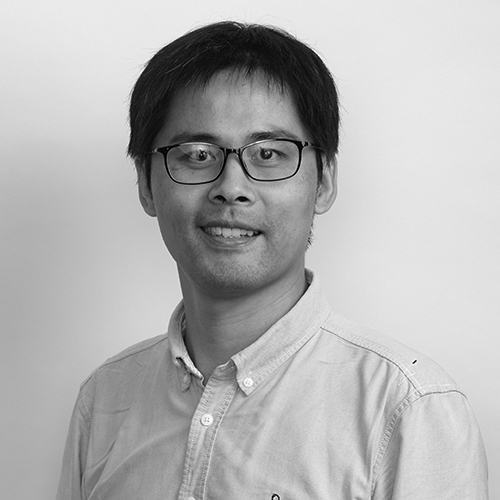
Baole Wen, Ph.D.
Assistant Professor, Mathematics
College of Arts & Sciences
Baole Wen is an assistant professor in the Department of Mathematics. Before joining New York Institute of Technology in 2022, he had been a postdoctoral assistant professor of mathematics at the University of Michigan and a postdoctoral fellow in the Oden Institute for Computational Engineering and Sciences at the University of Texas at Austin. Baole received his Ph.D. in Applied Mathematics from the University of New Hampshire in 2015. His Ph.D. research was focused on understanding the underlying flow and transport mechanisms governing the spatiotemporally chaotic system of porous medium convection at large Rayleigh numbers. He obtained a master’s degree in fluid mechanics and a bachelor’s degree in engineering mechanics from Beijing University of Aeronautics and Astronautics in 2010 and 2007, respectively.
Read More
Baole’s research interests cover broad areas of applied and computational mathematics, including fluid mechanics, mathematical modeling, PDE-constrained optimization, scientific computing, model order reduction, efficient numerical algorithms, and pattern formation and nonlinear dynamics in high-dimensional spatiotemporal dynamical systems. To conduct his research, Baole employs direct numerical simulations, high-performance computing, variational and stability analyses, optimization, dynamical system theory, and experimental validation.
Recent Projects/Research
- Exact coherent states in Rayleigh-Bénard convection
- Flow and transport in porous media
- Optimal mixing by incompressible flows

Dong Zhang, Ph.D.
Professor, Biomedical Sciences
College of Osteopathic Medicine
Dong Zhang received his Ph.D. in biochemistry and molecular biology from Brandeis University and performed his postdoctoral training at Baylor College of Medicine and Harvard Medical School.
Recent Projects/Research
- Target Breast Cancer and Ovarian Using Synthetic Lethal Strategy
- Investigate Crosstalk Between DNA Damage Response and Centrosome Biogenesis
- Investigate Molecular Mechanism of DNA Damage Checkpoint and DNA Repair
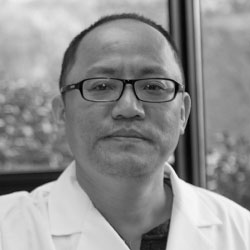
Haotian Zhao, M.D., Ph.D.
Professor, Biomedical Sciences
College of Osteopathic Medicine
Haotian Zhao is a professor in the Department of Biomedical Sciences at NYITCOM. He holds both M.D. and Ph.D. degrees in medicine and molecular biology, respectively. He earned his undergraduate and graduate medical degrees from China Medical University and received his Ph.D. in Molecular, Cellular, and Developmental Biology from Ohio State University. He completed postdoctoral research at the prestigious St. Jude Children’s Research Hospital, where he began his focus on pediatric brain tumor biology.
Read More
At NYITCOM, Zhao leads a research group dedicated to understanding the molecular and cellular mechanisms underlying childhood brain tumors. His team utilizes genetic models, cellular biology techniques, and next-generation sequencing technologies to study the dynamic transcriptomic and epigenetic landscapes of pediatric tumors. He has developed several preclinical models aimed at studying tumor progression and evaluating therapeutic interventions that target tumor growth while minimizing damage to the developing brain.
Zhao is a prolific researcher and has co-authored numerous high-impact publications in Cancer Research, Nature Cell Biology, Neuro-Oncology, and Cell Death & Differentiation, among others. His work has received recognition through awards from organizations such as the Society for Neuro-Oncology and the Great Plains IDeA-CTR Network.
Recent Projects/Research
Zhao’s lab is currently focused on two key research areas:
- Leptomeningeal Metastasis in Medulloblastoma (MB)
MB is the most common malignant pediatric brain tumor. Leptomeningeal metastasis, a frequent occurrence at diagnosis and relapse, involves tumor cell dissemination along the brain and spinal cord’s leptomeninges. Zhao’s group investigates the molecular drivers of this metastatic spread, aiming to develop targeted therapies to interrupt this process. - Modeling and Targeting Rare Pediatric Brain Tumors
His lab has developed innovative animal models of choroid plexus (CP) papilloma and carcinoma. These models mimic human tumor pathology and are used to explore novel therapeutic targets and vulnerabilities. Orthotopic transplantation techniques are employed to assess drug efficacy, with the goal of improving treatment strategies for these rare but aggressive cancers.
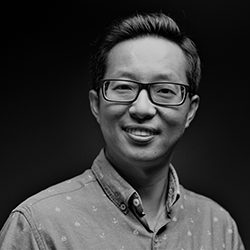
Yingtao (Jerry) Zhao, Ph.D.
Associate Professor, Biomedical Sciences
College of Osteopathic Medicine
Zhao received his Ph.D. in Bioinformatics from the Chinese Academy of Sciences, where he specialized in genomics and bioinformatics, and earned his bachelor’s degree in economics from Nanjing University. Lastly, he received his postdoctoral training in epigenetics and brain disorders from the University of Pennsylvania.
Zhao is a biomedical scientist specializing in genomics, glycobiology, and neurobiology. His research aims to understand the molecular basis of heparan sulfate, long genes, and brain disorders. His research uses multidisciplinary approaches, including disease mouse models, genomics, glycobiology, neuroscience, bioinformatics, and molecular biology.
Recent Projects/Research
The Zhao laboratory is particularly focused on heparan sulfate and long genes.
- Heparan sulfate is a sugar molecule that covers the surface of all human cells. Heparan sulfate plays an important role in the pathogenesis of multiple brain disorders, such as Alzheimer’s disease, Parkinson’s disease, and Kallmann syndrome.
- Long genes (> 100 kilobases) are specifically expressed in the brain and show unique genomic and epigenomic features. Long genes are associated with brain disorders, such as autism, amyotrophic lateral sclerosis, and Alzheimer’s disease. The long-term goal of the Zhao laboratory is to use mouse models, genomics, and epigenetics to reveal the role and molecular mechanisms of heparan sulfate and long genes in brain disorders, with the hope of eventually developing a cure.